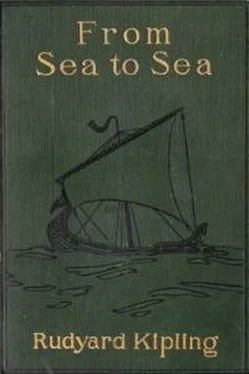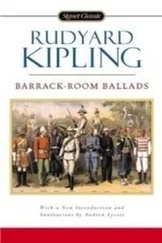Джозеф Киплинг - From Sea to Sea
Здесь есть возможность читать онлайн «Джозеф Киплинг - From Sea to Sea» весь текст электронной книги совершенно бесплатно (целиком полную версию без сокращений). В некоторых случаях можно слушать аудио, скачать через торрент в формате fb2 и присутствует краткое содержание. Год выпуска: 2014, Издательство: epubBooks Classics, Жанр: Биографии и Мемуары, Публицистика, на английском языке. Описание произведения, (предисловие) а так же отзывы посетителей доступны на портале библиотеки ЛибКат.
- Название:From Sea to Sea
- Автор:
- Издательство:epubBooks Classics
- Жанр:
- Год:2014
- ISBN:нет данных
- Рейтинг книги:3 / 5. Голосов: 1
-
Избранное:Добавить в избранное
- Отзывы:
-
Ваша оценка:
- 60
- 1
- 2
- 3
- 4
- 5
From Sea to Sea: краткое содержание, описание и аннотация
Предлагаем к чтению аннотацию, описание, краткое содержание или предисловие (зависит от того, что написал сам автор книги «From Sea to Sea»). Если вы не нашли необходимую информацию о книге — напишите в комментариях, мы постараемся отыскать её.
From Sea to Sea — читать онлайн бесплатно полную книгу (весь текст) целиком
Ниже представлен текст книги, разбитый по страницам. Система сохранения места последней прочитанной страницы, позволяет с удобством читать онлайн бесплатно книгу «From Sea to Sea», без необходимости каждый раз заново искать на чём Вы остановились. Поставьте закладку, и сможете в любой момент перейти на страницу, на которой закончили чтение.
Интервал:
Закладка:
It was aristocratic–looking coal, just like the picked lumps that are stacked in baskets of coal agencies at home with the printed legend atop "only 23 s a ton." But there was no picking in this case. The great piled banks were all "equal to sample," and beyond them lay piles of small, broken, "smithy" coal. "The Company doesn't sell to the public. This small, broken coal is an exception. That is sold, but the big stuff is for the engines and the shops. It doesn't cost much to get out, as you say; but our men can earn as much as twelve rupees a month. Very often when they've earned enough to go on with they retire from the concern till they've spent their money and then come on again. It's piece–work and they are improvident. If some of them only lived like other natives they would have enough to buy land and cows with. When there's a press of work they make a good deal by overtime, but they don't seem to keep it. You should see Giridih Bazaar on a Sunday if you want to know where the money goes. About ten thousand rupees change hands once a week there. If you want to get at the number of people who are indirectly dependent or profit by the E. I. R. you'll have to conduct a census of your own. After Sunday is over the men generally lie off on Monday and take it easy on Tuesday. Then they work hard for the next four days and make it up. Of course there's nothing in the wide world to prevent a man from resigning and going away to wherever he came from—behind those hills if he's a Sonthal. He loses his employment, that's all. But they have their own point of honour. A man hates to be told by his friends that he has been guilty of shirking. And now we'll go to breakfast. You shall be 'pitted' to–morrow to any depth you like."
Chapter II
In the Depths
"Pitted to any extent you please." The only difficulty was for Joseph to choose his pit. Giridih was full of them. There was an arch in the side of a little hill, a blackened brick arch leading into thick night. A stationary engine was hauling a procession of coal–laden trucks—"tubs" is the technical word—out of its depths. The tubs were neither pretty nor clean. "We are going down in those when they are emptied. Put on your helmet and keep it on, and keep your head down."
There is nothing mirth–provoking in going down a coal–mine—even though it be only a shallow incline running to one hundred and forty feet vertical below the earth. "Get into the tub and lie down. Hang it, no! This is not a railway carriage: you can't see the country out of the windows. Lie down in the dust and don't lift your head. Let her go!"
The tubs strain on the wire rope and slide down fourteen hundred feet of incline, at first through a chastened gloom, and then through darkness. An absurd sentence from a trial report rings in the head: "About this time prisoner expressed a desire for the consolations of religion." A hand with a reeking flare–lamp hangs over the edge of the tub, and there is a glimpse of a blackened hat near it, for those accustomed to the pits have a merry trick of going down sitting or crouching on the coupling of the rear tub. The noise is deafening, and the roof is very close indeed. The tubs bump, and the occupant crouches lovingly in the coal dust. What would happen if the train went off the line? The desire for the "consolations of religion" grows keener and keener as the air grows closer and closer. The tubs stop in darkness spangled by the light of the flare–lamps which many black devils carry. Underneath and on both sides is the greasy blackness of the coal, and, above, a roof of grey sandstone, smooth as the flow of a river at evening. "Now, remember that if you don't keep your hat on, you'll get your head broken, because you will forget to stoop. If you hear any tubs coming up behind you step off to one side. There's a tramway under your feet: be careful not to trip over it."
The miner has a gait as peculiarly his own as Tommy's measured pace or the bluejacket's roll. Big men who slouch in the light of day become almost things of beauty underground. Their foot is on their native heather; and the slouch is a very necessary act of homage to the great earth, which if a man observe not, he shall without doubt have his hat—bless the man who invented pith hats!—grievously cut.
The road turns and winds and the roof becomes lower, but those accursed tubs still rattle by on the tramways. The roof throws back their noises, and when all the place is full of a grumbling and a growling, how under earth is one to know whence danger will turn up next? The air brings to the unacclimatised a singing in the ears, a hotness of the eyeballs, and a jumping of the heart. "That's because the pressure here is different from the pressure up above. It'll wear off in a minute. We don't notice it. Wait till you get down a four–hundred–foot pit. Then your ears will begin to sing, if you like."
Most people know the One Night of each hot weather—that still, clouded night just before the Rains break, when there seems to be no more breathable air under the bowl of the pitiless skies, and all the weight of the silent, dark house lies on the chest of the sleep–hunter. This is the feeling in a coal–mine—only more so—much more so, for the darkness is the "gross darkness of the inner sepulchre." It is hard to see which is the black coal and which the passage driven through it. From far away, down the side galleries, comes the regular beat of the pick—thick and muffled as the beat of the labouring heart. "Six men to a gang, and they aren't allowed to work alone. They make six–foot drives through the coal—two and sometimes three men working together. The rest clear away the stuff and load it into the tubs. We have no props in this gallery because we have a roof as good as a ceiling. The coal lies under the sandstone here. It's beautiful sandstone." It was beautiful sandstone—as hard as a billiard table and devoid of any nasty little bumps and jags.
There was a roaring down one road—the roaring of infernal fires. This is not a pleasant thing to hear in the dark. It is too suggestive. "That's our ventilating shaft. Can't you feel the air getting brisker? Come and look."
Imagine a great iron–bound crate of burning coal, hanging over a gulf of darkness faintly showing the brickwork of the base of a chimney. "We're at the bottom of the shaft. That fire makes a draught that sucks up the foul air from the bottom of the pit. There's another down–draw shaft in another part of the mine where the clean air comes in. We aren't going to set the mines on fire. There's an earth and brick floor at the bottom of the pit; the crate hangs over. It isn't so deep as you think." Then a devil—a naked devil—came in with a pitchfork and fed the spouting flames. This was perfectly in keeping with the landscape.
More trucks, more muffled noises, more darkness made visible, and more devils—male and female—coming out of darkness and vanishing. Then a picture to be remembered. A great Hall of Eblis, twenty feet from inky–black floor to grey roof, upheld by huge pillars of shining coal, and filled with flitting and passing devils. On a shattered pillar near the roof stood a naked man, his flesh olive–coloured in the light of the lamps, hewing down a mass of coal that still clove to the roof. Behind him was the wall of darkness, and when the lamps shifted he disappeared like a ghost. The devils were shouting directions, and the man howled in reply, resting on his pick and wiping the sweat from his brow. When he smote the coal crushed and slid and rumbled from the darkness into the darkness, and the devils cried Shabash! The man stood erect like a bronze statue, he twisted and bent himself like a Japanese grotesque, and anon threw himself on his side after the manner of the dying gladiator. Then spoke the still small voice of fact: "A first–class workman if he would only stick to it. But as soon as he makes a little money he lies off and spends it. That's the last of a pillar that we've knocked out. See here. These pillars of coal are square, about thirty feet each way. As you can see, we make the pillar first by cutting out all the coal between. Then we drive two square tunnels, about seven feet wide, through and across the pillar, propping it with balks. There's one fresh cut."
Читать дальшеИнтервал:
Закладка:
Похожие книги на «From Sea to Sea»
Представляем Вашему вниманию похожие книги на «From Sea to Sea» списком для выбора. Мы отобрали схожую по названию и смыслу литературу в надежде предоставить читателям больше вариантов отыскать новые, интересные, ещё непрочитанные произведения.
Обсуждение, отзывы о книге «From Sea to Sea» и просто собственные мнения читателей. Оставьте ваши комментарии, напишите, что Вы думаете о произведении, его смысле или главных героях. Укажите что конкретно понравилось, а что нет, и почему Вы так считаете.












